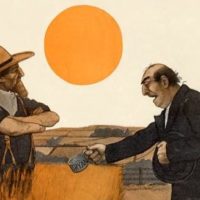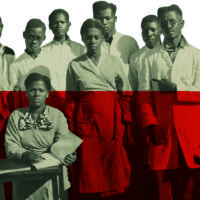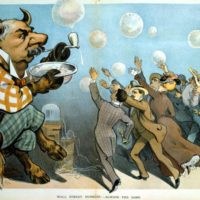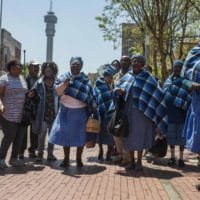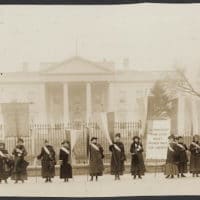-
The Berlin Wall thirty years later
Even thirty years have not accustomed all ex-GDR citizens to seeing youngsters in the streets with their ragged dogs and paper cups for charitable donations, concert violinists begging money with Mozart in cold subway stations or, on icy nights, homeless huddled figures in sleeping bags on the stations’ concrete floors.
-
What to expect from Turkey’s coming invasion of Syria
Erdogan’s government is preparing to enter Syria for a major military operation against the Syrian Democratic Forces (SDF), which is made up largely of Kurdish factions who set up this armed force to defend the mainly Kurdish enclave in northern Syria.
-
The Venceremos Brigade at 50
As the U.S. ramps up its global efforts to protect genocidal racial capitalism, it is a crucial time for a new generation to study and learn from Cuba’s 60-year effort to build an alternative socio-economic system.
-
Money Politics before the New Deal with Jakob Feinig
Jakob Feinig, assistant professor of human development at Binghamton University, joins Money on the Left to discuss the history of political organizing and activism around money in the United States, from the pre-Revolutionary period to the New Deal era. Characterized alternately by periods of widespread “silencing” and mass mobilization, the history of money politics that […]
-
Dossier no. 20: When you ill-treat the African people, i see you
The Industrial & Commercial Workers’ Union (ICU)—a trade union, rural peasant movement, and urban squatters’ movement—formed on the docks in Cape Town in 1919. Within a decade, the ICU had expanded across Southern Africa without regard for national borders and counted people from various African countries and the Caribbean in its leadership, as well as people who were Indian and mixed race. The largely forgotten history of the ICU is well worth recovering in a time of escalating chauvinism and xenophobia. Our Dossier #20 offers an introduction to this extraordinary popular movement.
-
A Tale of Corruption by the United Auto Workers and the Big Three American Automakers
What follows is a somewhat complex tale of what happens when a labor union, structured to be unaccountable to the rank-and-file membership, embraces a system of labor-management cooperation rather than a class-conscious understanding that workers and their employers are adversaries with fundamentally opposed goals and desires.
-
Imagining a free Palestine should be commonplace—that’s why I wrote the novel ‘Siegebreakers’
The siege of Gaza is crushing the people who live under it, and it is crushing all of our imaginations.
-
Why Kashmir is suddenly a potential global point of conflict
Before India’s Home Minister Amit Shah introduced the Jammu and Kashmir Reorganization Bill in the Indian Parliament, his government sent tens of thousands of Indian troops into Kashmir. There is no official number, but it is often said that there are nearly 600,000 Indian troops in the state. That a population of 12 million people needs this kind of armed action suggests that they are an occupied people.
-
The U.S.-Iran standoff can only end when the U.S. accepts Iran’s right to have a nuclear energy program
The U.S. objection to Iran is not based on international law, but merely based on its political objectives. This is clearly illustrated by open U.S. support for nuclear energy and nuclear weapon development in India; and nuclear weapon stockpiling in Israel, which the U.S. has always fully backed.
-
Today’s Struggle for a Green New Deal: Lessons from the Freedom Budget of the 1960s
The potential mass appeal of the Freedom Budget failed to materialize in part because “realistic” compromises were made by its supporters: partisans of the Green New Deal should not make the same mistake.
-
Whose history? Why the People’s History Museum is vital
In recent months, high-profile figures have claimed museums should be ‘neutral’ spaces. Thank goodness, then, for the People’s History Museum, writes Danielle Child
-
Marxism, space and a few urban questions: a rough guide to the English language Lliterature
Starting in the late 1960s, ‘radical geography’ became a crucial avenue of intellectual innovation in contemporary Marxism. For a generation, its basic orientation was two-fold: (1) politicise ‘space’ by challenging the stranglehold of specialists (architects, urban planners, designers, military planners, regional and development officials) in the spatial disciplines, and (2) insist, simultaneously, on the importance of spatial questions within the various currents of the left.
-
Inflation & the Politics of Pricing with Nathan Tankus
In this episode, we talk with Nathan Tankus, Research Director of the Modern Money Network, and Research Fellow at the Clarke Business Law Institute at Cornell Law School. We ask Nathan to expand upon and deepen his engagement with the inflation question in all its historical, political, and rhetorical complexity.
-
Working Group on the ‘Anthropocene’
Following guidance from the Subcommission on Quaternary Stratigraphy and the International Commission on Stratigraphy, the AWG have completed a binding vote to affirm some of the key questions that were voted on and agreed at the IGC Cape Town meeting in 2016.
-
Colored Property & State Debt with David Freund
In this episode, we talk with David Freund, associate professor of history at the University of Maryland. David is the author of Colored Property: State Policy and White Racial Politics in Suburban America, an award-winning book that tracks how the language of racial exclusion was re-coded in terms of markets, property, and citizenship in the post-World War II era.
-
On Eric Hobsbawm and other matters
The failures of Richard Evans the biographer reveals the greatness of Eric Hobsbawm the historian.
-
Dossier 16: Resource sovereignty—the Agenda for Africa’s exit from the state of plunder
In this interview Gyekye Tanoh, head of the Political Economy Unit at the Third World Network-Africa based in Accra (Ghana), elaborates upon the themes of corporate plunder, resource nationalism and people-centered forms of resource management in Africa.
-
Tricontinental Briefing No 1: Canadian mining companies
Introduction Of the world’s mining companies, 60% are headquartered in Canada. In February 2019, 216 companies were listed on the Toronto Stock Exchange (TSX) and 961 companies were listed on the TSX-Venture Exchange (TSXV). Mining accounts for 53% of the composite index. This kind of industry dominance suggests that investors trust the stability of the […]
-
‘A fully automated society is science fiction’—Michael D. Yates on the state of U.S. labor
Monthly Review Press editor Michael D. Yates reflects on the state of U.S. labor in this special May Day interview conducted by Farooque Chowdhury.
-
Women’s museums give voice to silenced histories
They can be a force for change, explains Rachel Thain-Gray




